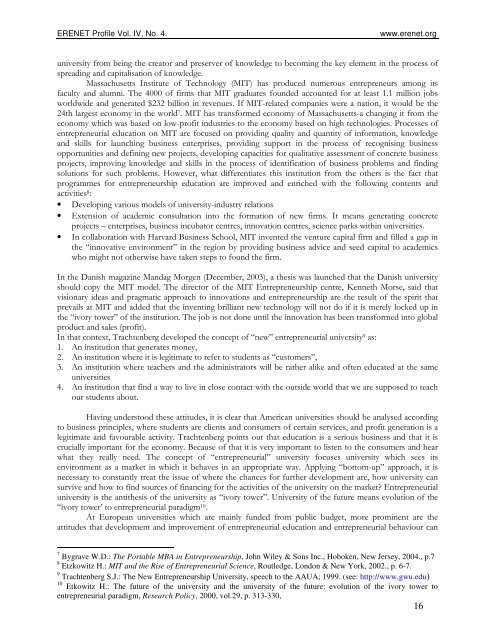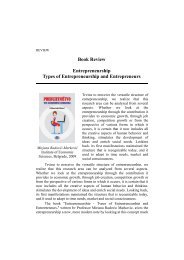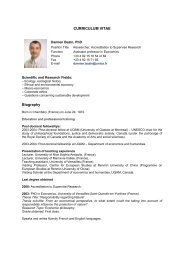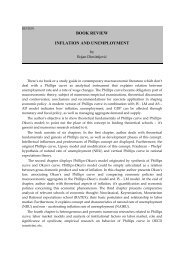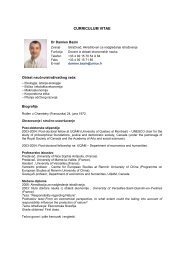Issue 16
Issue 16
Issue 16
Create successful ePaper yourself
Turn your PDF publications into a flip-book with our unique Google optimized e-Paper software.
ERENET Profile Vol. IV, No. 4.<br />
www.erenet.org<br />
university from being the creator and preserver of knowledge to becoming the key element in the process of<br />
spreading and capitalisation of knowledge.<br />
Massachusetts Institute of Technology (MIT) has produced numerous entrepreneurs among its<br />
faculty and alumni. The 4000 of firms that MIT graduates founded accounted for at least 1.1 million jobs<br />
worldwide and generated $232 billion in revenues. If MIT-related companies were a nation, it would be the<br />
24th largest economy in the world 7 . MIT has transformed economy of Massachusetts-a changing it from the<br />
economy which was based on low-profit industries to the economy based on high technologies. Processes of<br />
entrepreneurial education on MIT are focused on providing quality and quantity of information, knowledge<br />
and skills for launching business enterprises, providing support in the process of recognising business<br />
opportunities and defining new projects, developing capacities for qualitative assessment of concrete business<br />
projects, improving knowledge and skills in the process of identification of business problems and finding<br />
solutions for such problems. However, what differentiates this institution from the others is the fact that<br />
programmes for entrepreneurship education are improved and enriched with the following contents and<br />
activities 8 :<br />
• Developing various models of university-industry relations<br />
• Extension of academic consultation into the formation of new firms. It means generating concrete<br />
projects – enterprises, business incubator centres, innovation centres, science parks within universities.<br />
• In collaboration with Harvard Business School, MIT invented the venture capital firm and filled a gap in<br />
the “innovative environment” in the region by providing business advice and seed capital to academics<br />
who might not otherwise have taken steps to found the firm.<br />
In the Danish magazine Mandag Morgen (December, 2003), a thesis was launched that the Danish university<br />
should copy the MIT model. The director of the MIT Entrepreneurship centre, Kenneth Morse, said that<br />
visionary ideas and pragmatic approach to innovations and entrepreneurship are the result of the spirit that<br />
prevails at MIT and added that the inventing brilliant new technology will not do if it is merely locked up in<br />
the “ivory tower” of the institution. The job is not done until the innovation has been transformed into global<br />
product and sales (profit).<br />
In that context, Trachtenberg developed the concept of “new” entrepreneurial university 9 as:<br />
1. An institution that generates money,<br />
2. An institution where it is legitimate to refer to students as “customers”,<br />
3. An institution where teachers and the administrators will be rather alike and often educated at the same<br />
universities<br />
4. An institution that find a way to live in close contact with the outside world that we are supposed to teach<br />
our students about.<br />
Having understood these attitudes, it is clear that American universities should be analysed according<br />
to business principles, where students are clients and consumers of certain services, and profit generation is a<br />
legitimate and favourable activity. Trachtenberg points out that education is a serious business and that it is<br />
crucially important for the economy. Because of that it is very important to listen to the consumers and hear<br />
what they really need. The concept of “entrepreneurial” university focuses university which sees its<br />
environment as a market in which it behaves in an appropriate way. Applying “bottom-up” approach, it is<br />
necessary to constantly treat the issue of where the chances for further development are, how university can<br />
survive and how to find sources of financing for the activities of the university on the market? Entrepreneurial<br />
university is the antithesis of the university as “ivory tower”. University of the future means evolution of the<br />
“ivory tower’ to entrepreneurial paradigm 10 .<br />
At European universities which are mainly funded from public budget, more prominent are the<br />
attitudes that development and improvement of entrepreneurial education and entrepreneurial behaviour can<br />
7 Bygrave W.D.: The Portable MBA in Entrepreneurship, John Wiley & Sons Inc., Hoboken, New Jersey, 2004., p.7<br />
8 Etzkowitz H.: MIT and the Rise of Entrepreneurial Science, Routledge, London & New York, 2002., p. 6-7.<br />
9 Trachtenberg S.J.: The New Entrepreneurship University, speech to the AAUA; 1999. (see: http://www.gwu.edu)<br />
10 Etkowitz H.: The future of the university and the university of the future: evolution of the ivory tower to<br />
entrepreneurial paradigm, Research Policy, 2000, vol.29, p. 313-330,<br />
<strong>16</strong>


